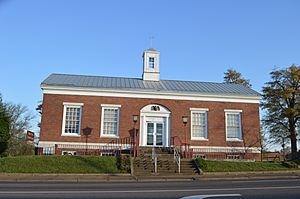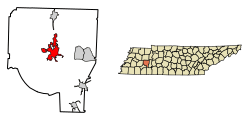Lexington, Tennessee facts for kids
Quick facts for kids
Lexington, Tennessee
|
||
|---|---|---|

Former post office in Lexington
|
||
|
||

Location in Henderson County, Tennessee
|
||
| Country | United States | |
| State | Tennessee | |
| County | Henderson | |
| Area | ||
| • Total | 11.88 sq mi (30.78 km2) | |
| • Land | 11.71 sq mi (30.32 km2) | |
| • Water | 0.18 sq mi (0.46 km2) | |
| Elevation | 522 ft (159.1 m) | |
| Population
(2020)
|
||
| • Total | 7,956 | |
| • Density | 679.59/sq mi (262.40/km2) | |
| Time zone | UTC-6 (CST) | |
| • Summer (DST) | UTC-5 (CDT) | |
| ZIP code |
38351
|
|
| Area code(s) | 731 | |
| FIPS code | 47-41980 | |
| GNIS feature ID | 1291101 | |
Lexington is a city in Henderson County, Tennessee, United States. It is located about halfway between the big cities of Memphis and Nashville. Lexington is about 10 miles south of Interstate 40, a major highway that connects these two cities. In 2020, the city had a population of 7,956 people. Lexington is also the county seat of Henderson County, which means it's where the county government is located.
Contents
History of Lexington
Early Days and Naming
Henderson County was created in 1821. Soon after, a spot near the center of the county was chosen to be the county seat. This new town was named Lexington. It was named to honor Lexington, Massachusetts, which was the site of the very first battle of the American Revolution.
The first building for the county government, called a county courthouse, was built in 1823. Lexington officially became a city in 1824. By 1830, about 260 people lived there.
Lexington During the Civil War
Before the American Civil War started, the people of Henderson County voted against leaving the United States. As the war went on, both the Union (Northern) and Confederate (Southern) armies recruited soldiers from the county.
A small battle, called a skirmish, happened in and around Lexington on December 18, 1862. Union Colonel Robert Ingersoll sent his soldiers to destroy a bridge over Beech Creek. This was to stop Confederate soldiers from moving into the area. However, Ingersoll's troops did not destroy the bridge.
Confederate General Nathan Bedford Forrest's troops then moved into Lexington. Forrest's soldiers defeated the Union troops. They captured over 140 Union soldiers, including Colonel Ingersoll. They also took cannons and supplies that the Union soldiers left behind when they escaped.
Geography of Lexington
Lexington has a total area of about 11.7 square miles (30.3 square kilometers). Most of this area, about 11.5 square miles (29.8 square kilometers), is land. A small part, about 0.2 square miles (0.5 square kilometers), is water.
The city is also located about six miles (10 kilometers) south of Natchez Trace State Park. This park is a popular place for outdoor activities.
Population Information
| Historical population | |||
|---|---|---|---|
| Census | Pop. | %± | |
| 1880 | 329 | — | |
| 1890 | 715 | 117.3% | |
| 1900 | 1,332 | 86.3% | |
| 1910 | 1,497 | 12.4% | |
| 1920 | 1,792 | 19.7% | |
| 1930 | 1,823 | 1.7% | |
| 1940 | 2,526 | 38.6% | |
| 1950 | 3,566 | 41.2% | |
| 1960 | 3,943 | 10.6% | |
| 1970 | 5,024 | 27.4% | |
| 1980 | 5,934 | 18.1% | |
| 1990 | 5,810 | −2.1% | |
| 2000 | 7,393 | 27.2% | |
| 2010 | 7,652 | 3.5% | |
| 2020 | 7,956 | 4.0% | |
| Sources: | |||
2020 Census Details
The 2020 United States census counted 7,956 people living in Lexington. There were 3,150 households and 1,915 families in the city.
The table below shows the different racial groups in Lexington based on the 2020 census:
| Race | Number of People | Percentage |
|---|---|---|
| White (not Hispanic) | 6,085 | 76.48% |
| Black or African American (not Hispanic) | 1,037 | 13.03% |
| Native American | 12 | 0.15% |
| Asian | 64 | 0.8% |
| Other/Mixed | 450 | 5.66% |
| Hispanic or Latino | 308 | 3.87% |
Education in Lexington
Lexington has public schools that are managed by two different systems: the Henderson County School System and the Lexington City School System.
There are three main schools in Lexington:
- Paul G. Caywood Elementary School
- Lexington Middle School
- Lexington High School
Lexington High School is part of the Henderson County School System. Paul G. Caywood Elementary School (often called "Caywood") and Lexington Middle School (LMS) are both part of the Lexington City School System.
Higher Education
Lexington is also home to the Lexington-Henderson County Center of Jackson State Community College. This college center opened in 1999. It offers all the classes needed to earn an associate degree in General Studies. Students can also take other classes that count towards more degrees at the main campus in Jackson, Tennessee. These credits can also be transferred to other universities.
This center has become a popular choice for students graduating from Lexington High School and other nearby high schools. Many choose to continue their education here. Its popularity grew even more after the "Tennessee Promise" program started. This state program helps students by paying for two years of tuition at community colleges and technical colleges in Tennessee.
Local News
Lexington has a local newspaper called The Lexington Progress. It has been published since 1884. Another local publication is Tennessee Magnet Publications.
Arts and Culture
Libraries and Museums
The Lexington-Henderson County Everett Horn Public Library serves the city. It's a great place to find books and other resources.
Lexington is also home to the very popular Beech Lake. This lake is a favorite spot for many people. The city also has one museum, the Beech River Heritage Museum. This museum displays many historical items from Lexington and Henderson County.
Barbecue Capital
Lexington claims to be the "barbecue capital" of the country. People say it has more barbecue restaurants per person than any other city in the United States!
City Services
Henderson County Community Hospital is located in Lexington. It provides healthcare services to the people living in Lexington and the surrounding area.
Sports in Lexington
From 1935 to 1938, Lexington had its own Minor League Baseball team. They played in a league called the Kentucky–Illinois–Tennessee League.
The team was known as the Lexington Giants from 1935 to 1938. In 1938, the team changed its name to the Lexington Bees. This happened when they became a "farm club" for the National League's Boston Bees. A farm club is a team where younger players develop their skills before possibly playing for a major league team.
Notable People from Lexington
- Dick Barry (1926–2013) – a lawyer and politician.
- Buddy Cannon (born 1947) – a singer-songwriter and music producer.
- Mills Darden (1799–1857) – known as one of the largest men in history, he lived, died, and was buried here.
- Doug Gilbert (born 1969) – a professional wrestler.
- Eddie Gilbert (1961–1995) – also a professional wrestler.
- Sam Taylor (1916–1990) – a talented saxophonist.
See also
 In Spanish: Lexington (Tennessee) para niños
In Spanish: Lexington (Tennessee) para niños


